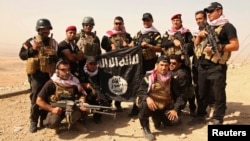Against the grim backdrop of global terrorism and a deadly health crisis, world leaders will convene in New York this week for their annual gathering at the U.N. General Assembly. The terrorist group calling itself the Islamic State (also known as ISIL or ISIS), and efforts to control the spread of the Ebola virus, are expected to dominate discussions.
U.N. Secretary-General Ban Ki-moon said the international community will focus on addressing the violence in Iraq and Syria, which have become a breeding ground for extremist groups, most notably Islamic State militants.
“I welcome the growing international consensus to act against this serious threat to global and regional peace and security," Ban said.
Last Friday, U.S. Secretary of State John Kerry chaired a ministerial-level meeting of the U.N. Security Council to discuss Iraq, in which he thanked the dozens of countries that have offered critical commitments to this fight against Islamic State militants.
“ISIL poses a threat to all of us, and we are committed to working in close partnership with the new Iraqi government and countries around the world to defeat it," he said.
A centerpiece of that effort will be a high-level U.N. Security Council meeting chaired by U.S. President Barack Obama on Wednesday about the rise of foreign terrorist fighters. Leaders will discuss stopping the flow of finances to radicals and ways to counter violent extremism.
New York University professor Richard Gowan says the meeting is intended to send an important political message.
“President Obama has put together a coalition of 40 countries to fight ISIS. At the U.N. he will be reaffirming that struggle. Actually, most of the hard work has been done already, but the U.N. is a good stage to talk about the need to fight the Islamists," he said.
Ebola
Also high on the international agenda will be containing the fast-moving outbreak of the Ebola virus, which has killed about half of the more than 5,000 people infected with it in West Africa.
The U.N. chief announced last week that he is creating a special health mission to deal with the virus that will mobilize human, material, logistic and financial resources to affected countries.
“This is not just a health crisis. It has grave humanitarian, economic and social consequences that could spread far beyond the affected countries," Ban said.
Crises in Africa, the conflict in Ukraine and the aftermath of the 50-day war in the Gaza Strip are other issues that will be discussed by the leaders. The secretary-general also is convening a summit on climate change to urge that countries make commitments to cut greenhouse gas emissions.
NYU’s Gowan says the past year has been an especially difficult one for the international community, with diplomatic fights over Syria and Ukraine. But he notes the challenges from Islamic State and Ebola provide common ground for governments to agree. He predicts there will be a big push to try to restore some international unity after a divisive year.





